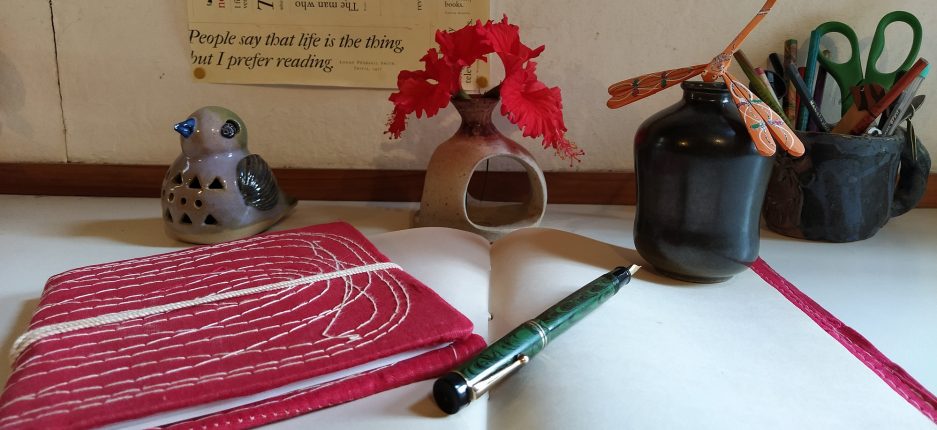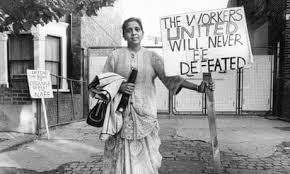In the last few months there has been a lot of news about Junior and Senior doctors in the UK going on strike to draw attention to their demands. There are often pictures of the picketing medicos. These include a large number of Asian and other ‘non-white’ faces. Today the non-English population makes up a large portion of the work force in the UK. While there is a continuing stream of migrants making their way to the UK for higher education, and often continuing to work after their studies, there is an equal number of second generation immigrants who have made UK their home over the last century. These are the descendants of the first immigrants who laid the path for the future of this generation.
There are numerous stories of these early immigrants who arrived in a totally alien, and often hostile, environment but who by dint of hard work, struggle, and ambition fought all the odds. One such feisty lady is still remembered for breaking many barriers.
Jayaben Desai began her life in Gujarat in India, where she was born on 2 April 1933. She moved to Tanganyika after her marriage to Suryakant Desai a tyre-factory manager. There she led a comfortable life as part of the large community of British subjects of Indian origin who had long settled in East Africa. In the 1960s the situation changed with many of the newly-independent countries in East Africa moving towards “Africanisation’ policies which led to declining economic opportunities and security for the East African Asians. Many of these chose to move. As British passport holders they headed for Britain. Jayaben and her husband joined this exodus.
Life in Britain was very different. The new migrants did not enjoy the economic and social status that they had done in East Africa. Despite being British citizens they had to struggle at every step to establish new lives and livelihoods in an unwelcoming environment. Most of them were educated and professionally qualified, but in England they were compelled to take whatever work they could get; most of which was unskilled labour with poor wages. They faced a great deal of discrimination, racism and prejudice in every aspect of life.
As one of these women recalled: “There was no question of whether you wanted to or not – you had to work, so you did. And wherever you found work, you had to take it. It wasn’t that you were educated, so you only wanted certain kind of jobs – we had to work in factories and that’s how we brought up our children. …We used to have people working for us, and now we had to work for others. That’s life. …Of course I felt sad.”
Jayaben started part-time work as a sewing machinist in a sweatshop, while bringing up her two young children. She then moved to work at the Grunwick film processing factory in North-West London. Grunwick employed a large number of Asian women who were perceived as being hard working and submissive. The factory paid low wages, and was run in an atmosphere of fear and control, with workers being humiliated in many ways.
The simmering unrest began to surface when the managers sacked a young Indian worker, and three colleagues walked out in solidarity with him. Soon after, on Friday 20 August 1976, Jayaben Desai was confronted with a short-notice demand for overtime. She refused. The manager derogatively called her and her fellow workers “chattering monkeys”. She responded by telling the manager: “What you are running here is not a factory, it is a zoo. There are many types of animals in a zoo. Some are monkeys who dance to your tune, others are lions who can bite your head off. We are those lions, Mr Manager.”
Jayaben and almost 100 other workers spontaneously walked out in protest. Thus far, previous strikes by black and Asian workers had not received the support of trade unions. But the Grunwick strikers were supported by the Brent Trades Council; they were encouraged to form a union and received strike pay. Thus the strike was significant because it got trade union recognition, and also demonstrated the greatest solidarity So between the white and coloured working class. As Jayaben stressed during the strike, ‘We will not back down now. We want to bring this factory to a standstill. Our fight is for all our rights, and for our dignity. We hope all trade unionists will stand by us.’
Jayaben, and the striking workers travelled across England and addressed workers in other factories and workplaces about their fight, and this managed to persuade trade unionists from far and wide to come to their aid. By June 1977, as support for the strikers grew, the size of the mass pickets increased from a few hundred to several thousands. The strike began in 1976 and continued for two long years until 1978. This was possible, as the strikers received strike pay from the trade unions, which was comparable to the low pay they received at Grunwick. It was highly unusual for that time for unions to support ethnic minority groups and migrant workers. But the response rattled the Labour government who put pressure on the Trade Unions leadership to withdraw support. This did not deter the strikers led by Jayaben who started a hunger strike in November 1977. But even this action could not change the unions’ mind, and so they had to call off the strike. The strike came to an end without the workers getting their jobs back. However, one of its outcomes was the introduction of some concessions relating to existing and future workers’ pay and pensions.
As she later recalled: “Because of us, the people who stayed in Grunwick got a much better deal. When the factory moved, the van used to come to their home and pick them up because it was difficult for them to get to the new place. Can you imagine that? And they get a pension today! And we get nothing. That was because of us, because of our struggle.”
Despite its eventual failure, the Grunwick strike became a symbol for its demonstration of determination and solidarity. As Jayaben said: “The strike is not so much about pay, it is a strike about human dignity.” It is remembered for the way in which thousands of workers, black and white, men and women, united to defend the rights of migrant women workers. The feisty Jayaben who had catalysed the movement also changed the stereotype of South Asian women as being passive and submissive.
In recognition of her contribution to the struggle for workers’ rights, Jayaben Desai was awarded with a gold medal by the GMB trade union in 2007. She retained her indomitable spirit until she passed away at the age of 77, in December 2010.
–Mamata

